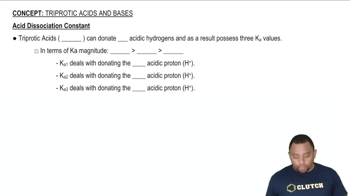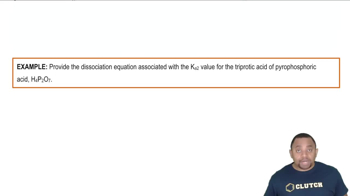Triprotic Acids and Bases definitions Flashcards
 Back
BackTriprotic Acids and Bases definitions
1/15
Terms in this set (15)
- Triprotic AcidA compound capable of donating three protons, each with a distinct dissociation constant.
- Phosphoric AcidA common triprotic acid that can donate three protons in sequential steps.
- Acid Dissociation Constant (Ka)A measure of the strength of an acid in solution, with distinct values for each proton lost.
- Ka1The dissociation constant for the first proton loss in a triprotic acid.
- Ka2The dissociation constant for the second proton loss in a triprotic acid.
- Ka3The dissociation constant for the third proton loss in a triprotic acid.
- Base Dissociation Constant (Kb)A measure of the strength of a base, inversely related to the acid dissociation constant.
- Kb1The base dissociation constant related to the third proton acceptance in a triprotic acid.
- Kb2The base dissociation constant related to the second proton acceptance in a triprotic acid.
- Kb3The base dissociation constant related to the first proton acceptance in a triprotic acid.
- Ion Product Constant for Water (Kw)The product of the concentrations of hydrogen and hydroxide ions in water.
- Intermediate FormA transitional state of a triprotic acid after losing one or two protons.
- Basic FormThe form of a triprotic acid after losing all three protons.
- Equilibrium ExpressionA mathematical representation of the concentrations of reactants and products at equilibrium.
- Hydronium IonA positively charged ion formed when an acid donates a proton to water.



